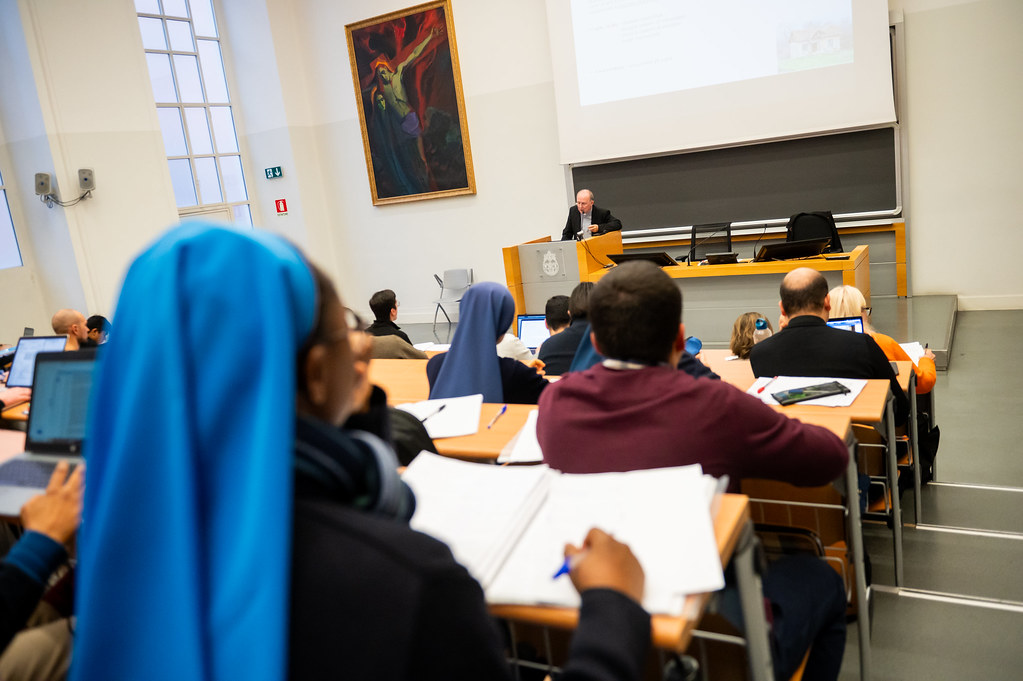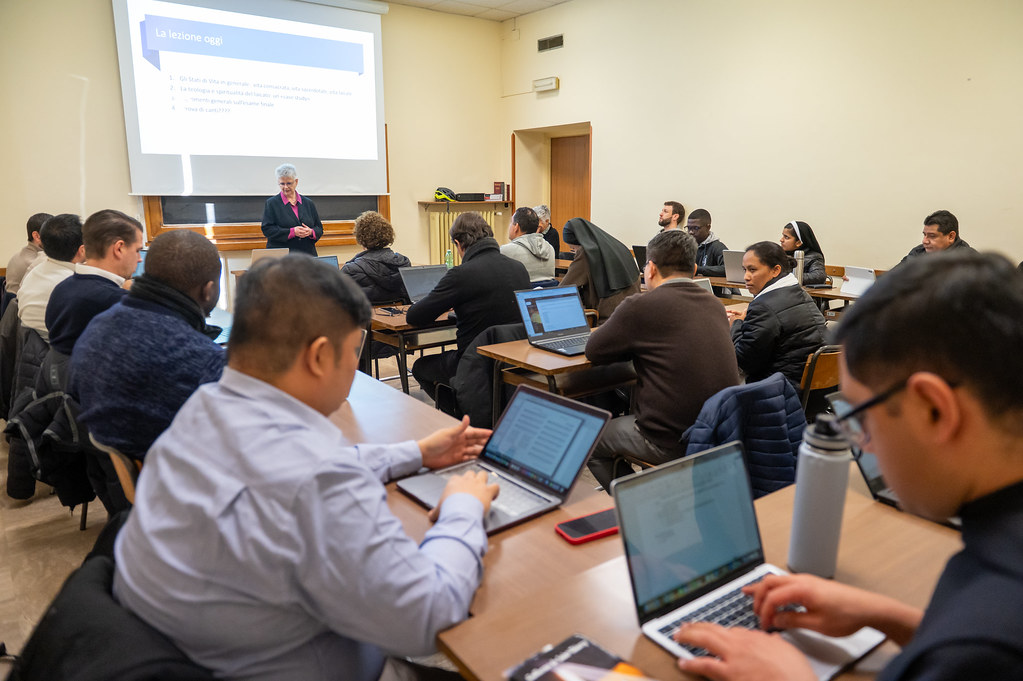- Home
- La Gregoriana
- 64 - Peace be with you all
- Moral Theology and Spiritual Theology. A newly integrated Department
Share:

This year, the university has created a new academic
unit called the ‘Department of Moral Theology
and Spiritual Theology’. The two programmes
are, by choice, kept distinct, but the two disciplines
naturally overlap in many ways. The aim is
to promote collaboration on different levels
and to reach a wider circle of students by exploring
the potentiality of a cross disciplinary dialogue
This year, the former Institute of Spirituality become part of the Faculty of Theology, through an integration with Moral Theology. Concretely, the University has created a new academic unit called the ‘Department of Moral Theology and Spiritual Theology’.
Prof. Orsuto, are you happy with the integration process?
“We have worked together with our colleagues from the Faculty of Theology to ensure a smooth transition. For the benefit of our students, we have seized the opportunity to build an innovative programme in Spiritual Theology that is up to date considering the needs of today’s Church and society. Concurrently, we have continued to strengthen our Moral Theology programme. In fact, the option of strengthening the implementation of the inter- and trans-disciplinarity of our studies is a direct response to Pope Francis’s wish expressed in the constitution Veritatis Gaudium, where the word ‘collaborate’ is used no less than 19 times.”
Is there a risk that the identity and uniqueness of the Moral Theology and Spiritual Theology programmes might be lost after the transition to the new, integrated department? Have some of our past students have been concerned about this change?
"We have reflected seriously on this during the transition. We decided to keep the two licentiate programmes and the two doctoral programmes distinct, rather than offer a mix of spiritual and moral theology. However, the two disciplines naturally overlap in many ways, and dialogue between the two has not been lacking in the past. On the one hand, Moral Theology at the Gregoriana, having opted for a personalist approach in the light of Vatican II, has a long tradition of seeing the good life as dependent on spiritually informed personal decision making and deepening one’s relationship with God. Spiritual theology in the Ignatian tradition, on the other hand, is enmeshed with the art of attuning one’s heart to God’s Spirit in view of discerning one’s deepest desires and making significant life choices which are good and holy."
In what way has there been an integration, concretely? How do you intend to foster dialogue between the two disciplines?
"We are seeking to promote collaboration on various levels. In our programming, we are developing a few courses which are common to the two licentiate programmes, and which help students reflect on issues that concern both disciplines. In our research, we have been promoting collaboration among professors of different disciplines and encouraging our doctoral students to avail themselves of the opportunities provided by our new integrated department. Regarding events, there are several cross-disciplinary initiatives in the pipeline; we will focus on this in the coming academic year."

Do you believe that, looking at the various fulcrums of theology today, the new department can address the needs of students interested in knowing and deepening the long spiritual and ethical experience of the church?
"Yes, I do. We are also seeking to reach an even wider circle of students by exploring the potentialities contained in the cross-disciplinary dialogue. We believe that by journeying together we will effectively strengthen our identity of being attentive to our vocation to serve in the church. We are doing this by confirming, on the one hand, the study paths established over the years in our beloved Institute and in the previous Department of Moral Theology, and, on the other hand, by opening ourselves to inspiration from both areas and laying the foundations for the implementation of a Synodal Spirituality in daily life."
You oversee a very diverse department. Why should students from all over the world come to Rome, learn Italian, and face many cultural barriers to study these disciplines at the Gregoriana?
"One good reason is the environment which is created when this happens. The many cultures, viewpoints, and local church experiences of our students and teaching staff greatly enrich our programmes and help us all to gain a wider knowledge of the Catholic world. This diversity is reinforced by the possibilities of personalisation which a relatively large ecclesiastical university offers. Of course, it is not a huge university where students are lost in the crowd. Rather, the size of our department allows us to follow the Ignatian pedagogical tradition that deeply values the personal care afforded to each student (cura personalis). Our students feel that, given the class sizes and extracurricular opportunities, they can develop a meaningful personal relationship with their professors and fellow students during their studies here, allowing them to express themselves, discuss issues they care about, and exchange ideas."
There are many theological centres in Rome. What are the added benefits of studying Moral Theology or Spiritual Theology at the Pontifical Gregorian University?
"The Gregoriana has nine faculties (graduate schools), which include those of the Pontifical Biblical Institute and the Pontifical Oriental Institute, two important missions of the University. Students can therefore fine-tune their curriculum of studies by adding courses and related specialisations, such as diploma courses. However, we take the idea of a 'specialisation' very seriously, dedicating considerable resources to each of the academic paths and sub-disciplines. Thus, our programmes have a solid core curriculum, which makes sure that the many possible optional courses available do not dilute the specialisations. Rather, when chosen wisely, electives can deepen our students’ growing expertise and orient it in one or more specific directions. The Gregorian is also part of a network of pontifical universities in Rome, and our students may take a course every semester, free of charge, in one of the other theology centres. Even our department has offerings which enrich our main programmes (licentiate and doctorate) and attract students from other disciplines. We offer, for example, a Diploma in Ignatian Spirituality and a Joint Diploma in Integral Ecology."

Is there a possibility of students coming to study at the Gregoriana as part of an exchange programme?
"Given the particular nature of pontifical universities in Italy, and their dependence on the Holy See, we do not have EU-funded exchange programmes for students and professors. However, students from other universities may study at our department for one to three semesters via the Freisemester programme, if their home university is willing to accept the Gregoriana’s ECTS credits. The programme is quite affordable, and we have a system of student grants for those in need of financial support."
You are also personally in charge of programming for the specializations in Spiritual Theology. Could you tell us more about the characteristics of the licentiate programme?
"At the Gregoriana, we understand Spiritual Theology as a field of study, research, and formation to be explored from various dimensions: systematic, biblical, historical, and psychological. We also have a particularly robust offering in Ignatian Spirituality. Hence, we offer, through the courses and through the structure of the programme as a whole, a synthetic formation in Spiritual Theology, marked by a strong sapiential tone, and we pay particular attention to spiritual discernment, in order to promote and support a true and profound integral formation of those following the programme. We strive to prepare students for teaching, research, spiritual direction as well as other ministries in response to the spiritual needs of today's world."

